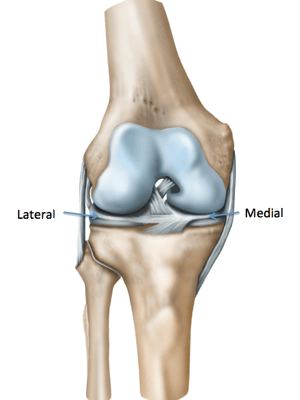Knee arthritis
Knee arthritis is damage to the smooth cartilage which normally lines the end of the bones. This can be wear and tear from a busy life, a result of a previous injury, or can come on for no obvious reason. It sometimes runs in families. It usually affects people in their 60s and 70s, but sadly also people a lot younger. It is quite a miserable problem to have but the good news is that I can help!

“Hi, For anyone contenplating having knee surgery Dr Charles Wilis -Owen is probably the finest surgeon in the country ! I had my second full knee replacement in Dec. 22 - now no pain ! walking 3-4 miles and cycling 20 miles at any one time- not everyday but 3 or 4 times a week. Can't recommend Charles enough- - Great surgeon. - Great communicator- - Everthing explained sympathetlcly. - No nonsense- positivity all the way. Best Martin Clark- Broadstone.
About the knee and arthritis
We tend to think of the knee as just one joint but actually it is made up of three main parts – commonly referred to as ‘compartments’: the inner (medial) compartment, the outer (lateral) compartment and kneecap (patellofemoral) compartment. Arthritis can come on in any one of these compartments, or in a combination of them. I actually published an important scientific paper on this topic and commonly observed patterns.

Is my knee pain arthritis?
If you’ve got arthritis you will nearly always have pain in the knee and probably some stiffness. To start with it is worse with activities, or just after activities (sport, work or walking). You may have stiffness and you may notice that the knee is swollen. Kneeling down can become difficult and it can be uncomfortable to sit for prolonged periods, then stiff and hard to get going when you get up. The pain is usually a dull aching pain a bit like a toothache. In the early stages it will respond well to anti-inflammatories or painkillers, but as the condition gets worse these become less effective.
Will it get worse?
Sorry, but the truth is that with time this will always get worse, but gradually! It will slowly start to affect your mobility and walking distances. Untreated it will spoil your lifestyle and ruin your quality of life. It will become painful at night-time and keep you awake or wake you up from sleep. When the symptoms reach this level it’s time to get it sorted out and consider having surgery in the form of a knee replacement. This is nothing to be terrified of – so don’t suffer for too long.
What can we do about it?
In the early stages of arthritis painkillers, physiotherapy and strengthening the muscles will help. For elderly people walking sticks can be helpful but that is not ideal for youngsters!
As the condition gets worse I can usually help you with injections of synthetic joint fluid (Durolane) or special biological injections called Platelet Rich Plasma (PRP). These can be useful in the right people. You can read more about injecting therapy here.
Knee surgeons used to do keyhole (arthroscopy) surgery for early arthritis to ‘wash the knee out’, but good scientific studies have now shown that this does not work for simple arthritis and may actually make things worse. Be careful of surgeons who are too keen to operate!
That said, if there are problems coming from a torn meniscus, or loose pieces in the knee then really gentle keyhole (arthroscopic) surgery can still be very useful. This is why it is important to see a real knee expert! You can read more about knee arthroscopy here.
What about knee replacements and resurfacing?
The knee replacements/resurfacings that we use today are very sophisticated pieces of metal and plastic. However, they still have a finite, but really long lifespan. It is a massive topic – so big I have put it on a different page here.
“Hi, For anyone contenplating having knee surgery Dr Charles Wilis -Owen is probably the finest surgeon in the country ! I had my second full knee replacement in Dec. 22 - now no pain ! walking 3-4 miles and cycling 20 miles at any one time- not everyday but 3 or 4 times a week. Can't recommend Charles enough- - Great surgeon. - Great communicator- - Everthing explained sympathetlcly. - No nonsense- positivity all the way. Best Martin Clark- Broadstone.
Are there any other options?
Depending on the pattern of your arthritis, and the compartments of the knee involved, you may be suitable for surgery to realign the leg (osteotomy), partial knee replacement (unicompartmental knee replacement – also known as Oxford knee replacement) or even some really clever surgery to grow new cartilage using your own cells to cover over the cartilage holes. Most surgeons who are not totally specialised in knees won’t have the full range of options to offer you – which is another reason to see someone who is a real expert in knees, not a jack of all trades.
Book a consultationFrequently asked questions
Yes - for sure. If you are self-funding then just get in touch, you don't even need a referral. I can get your NHS records and we can get you fixed in no time. Privately all your care will be with me personally and I will be with you every step of the way.
If you have insurance then please do check with your insurer first. Sometimes they want a referral - but I don't need it myself.
With private care, you will be looked after personally by me and you will see me every time. No trainee doctors who are still learning. Knee replacement is a tricky thing to do and not all surgeons are equal. Think of it like picking an artist to paint your portrait, or picking a restaurant for a special meal.
I will choose the best type of knee replacement for you, so it will be top of the range, not working within NHS budgets.
You won't be kept waiting.
If you need any extra help I will be there for you.
We always try to make sure there is no real wait. There are few things that take time to get ready, but if there are lots of people wanting to be fixed I will make more time. I operate on fixed days (it needs a big team to fix you) but we will do our best to accommodate your schedule.